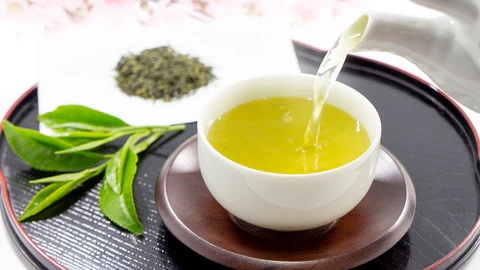Content Menu
● Introduction to L-Theanine
>> L-Theanine Content in Tea
● Top 5 Benefits of Green Tea L-Theanine for Mental Health
>> 1. Stress Reduction
>> 2. Cognitive Function Improvement
>> 3. Mood Enhancement
>> 4. Improved Sleep Quality
>> 5. Overall Mental Well-being
● Additional Considerations
>> Combination with Other Supplements
>> Potential Interactions
>> Long-Term Effects
● Conclusion
● FAQs
>> 1. What is the recommended dosage of L-theanine for mental health benefits?
>> 2. Can L-theanine be consumed with caffeine?
>> 3. Does L-theanine have any side effects?
>> 4. How does L-theanine affect brain waves?
>> 5. Can L-theanine help with depression?
● Citations:
Green tea has been a cornerstone of traditional medicine and wellness practices for centuries, particularly in Asian cultures. One of its key components, L-theanine, has garnered significant attention for its profound effects on mental health. This article delves into the top five benefits of green tea L-theanine, focusing on its impact on stress reduction, cognitive function, mood enhancement, sleep quality, and overall mental well-being.

Introduction to L-Theanine
L-theanine is a non-proteinogenic amino acid found predominantly in green tea (Camellia sinensis) and certain types of mushrooms. It is known for its unique ability to promote relaxation without inducing drowsiness, making it an attractive supplement for those seeking to improve their mental health.
L-Theanine Content in Tea
The content of L-theanine varies among different types of tea. Green tea generally contains higher levels of L-theanine compared to black tea, with an average of about 6.56 mg/g in green tea versus 5.13 mg/g in black tea. This variation is due to differences in processing methods and the tea plant's genetic makeup. For instance, the processing of black tea involves fermentation, which can reduce L-theanine levels, whereas green tea is steamed or pan-fried, preserving more of its natural amino acids.
Top 5 Benefits of Green Tea L-Theanine for Mental Health
1. Stress Reduction
L-theanine has been extensively studied for its anti-stress effects. It works by increasing the production of neurotransmitters like GABA, serotonin, and dopamine, which help regulate stress levels and promote a sense of calm. Studies have shown that even low doses of L-theanine can significantly reduce subjective stress responses in individuals. This makes it particularly beneficial for those dealing with chronic stress or anxiety disorders.
L-Theanine's Mechanism in Reducing Stress
| Mechanism | Effect |
| Increases GABA | Reduces anxiety |
| Enhances serotonin and dopamine | Improves mood |
| Promotes alpha brain waves | Enhances relaxation |
2. Cognitive Function Improvement
L-theanine has been found to improve cognitive functions such as attention and working memory. A study involving middle-aged and older adults demonstrated that L-theanine reduced reaction times in attention tasks and improved performance in working memory tests. This cognitive enhancement is attributed to L-theanine's ability to increase focus and concentration without the jittery effects often associated with stimulants.
- Attention: Enhanced focus and concentration.
- Working Memory: Improved ability to process and retain information.
- Executive Functions: Better decision-making and problem-solving skills.
3. Mood Enhancement
The ability of L-theanine to modulate neurotransmitter levels also contributes to its mood-enhancing effects. By increasing serotonin and dopamine, it can help alleviate symptoms of depression and anxiety, promoting a more stable and positive mood. This makes L-theanine a valuable adjunct to traditional treatments for mood disorders, though it should not be used as a replacement for medical therapy.
Neurotransmitter Balance and Mood
| Neurotransmitter | Effect on Mood |
| Serotonin | Reduces depression and anxiety |
| Dopamine | Enhances pleasure and motivation |
| GABA | Promotes relaxation and reduces stress |
4. Improved Sleep Quality
L-theanine can aid in improving sleep quality by promoting relaxation and reducing stress levels before bedtime. Its ability to increase GABA levels helps individuals fall asleep more easily and sleep more soundly. This is particularly beneficial for those experiencing insomnia or disrupted sleep patterns due to stress or anxiety.
5. Overall Mental Well-being
Beyond its specific benefits, L-theanine contributes to overall mental well-being by fostering a state of calm, attentive wakefulness. This makes it easier for individuals to manage daily stressors and maintain a positive outlook on life. Additionally, L-theanine's ability to enhance cognitive function and mood stability supports long-term mental health.
L-Theanine's Impact on Mental Well-being
| Aspect of Well-being | Effect of L-Theanine |
| Emotional Balance | Reduces anxiety and stress |
| Cognitive Clarity | Improves focus and concentration |
| Mood Stability | Enhances overall mood |

Additional Considerations
Combination with Other Supplements
L-theanine is often combined with other supplements to enhance its effects. For instance, pairing L-theanine with caffeine can create a synergistic effect, where L-theanine mitigates caffeine's jittery side effects while enhancing focus and alertness. This combination is popular among students and individuals requiring sustained mental performance.
Potential Interactions
While L-theanine is generally safe, it may interact with certain medications. For example, it could enhance the effects of sedatives or interact with blood pressure medications. Therefore, it is advisable to consult with a healthcare provider before adding L-theanine to your regimen, especially if you are taking prescription drugs.
Long-Term Effects
Research on the long-term effects of L-theanine is ongoing, but available data suggest that it is safe for prolonged use. Some studies indicate that regular consumption of green tea, which contains L-theanine, may reduce the risk of age-related cognitive decline and certain neurological disorders.
Conclusion
L-theanine, particularly in green tea, offers a multitude of benefits for mental health. From stress reduction and cognitive improvement to mood enhancement and better sleep quality, its effects are multifaceted and well-documented. As a natural and non-invasive approach to mental wellness, L-theanine is an attractive option for those seeking to improve their mental health without the side effects associated with many pharmaceuticals.

FAQs
1. What is the recommended dosage of L-theanine for mental health benefits?
The recommended dosage of L-theanine varies, but most studies suggest benefits at doses between 200 mg to 400 mg per day. However, even lower doses, such as 60 mg, have shown some stress-reducing effects.
2. Can L-theanine be consumed with caffeine?
Yes, L-theanine can be consumed with caffeine. In fact, the combination is often recommended as L-theanine can mitigate the jittery effects of caffeine while enhancing focus and alertness.
3. Does L-theanine have any side effects?
L-theanine is generally well-tolerated and has no significant side effects. However, high doses may cause drowsiness in some individuals.
4. How does L-theanine affect brain waves?
L-theanine increases alpha brain waves, which are associated with relaxation and reduced stress levels. This effect is observed without inducing drowsiness, making it beneficial for promoting a calm, focused state.
5. Can L-theanine help with depression?
While L-theanine is not a treatment for depression, it may help alleviate symptoms by promoting relaxation and improving mood. Regular consumption of green tea, which contains L-theanine, has been linked to a reduced risk of developing depression.
Citations:
[1] https://pmc.ncbi.nlm.nih.gov/articles/PMC9014247/
[2] https://www.jstage.jst.go.jp/article/jnsv/68/6/68_540/_pdf/-char/en
[3] https://yamamotoyama.co.jp/en/blogs/column/reading267
[4] https://pmc.ncbi.nlm.nih.gov/articles/PMC8080935/
[5] https://apjcn.nhri.org.tw/server/apjcn/17%20Suppl%201/167.pdf
[6] https://www.nature.com/articles/s41598-024-59383-y
[7] https://www.jstage.jst.go.jp/article/bpb/40/6/40_b17-00141/_article/-char/ja/
[8] https://pmc.ncbi.nlm.nih.gov/articles/PMC4728665/
[9] https://calgaryneuropathy.com/60-l-theanine/
[10] https://iris.unife.it/retrieve/e309ade4-917f-3969-e053-3a05fe0a2c94/Green_Tea_Amino_Acid_Accepted%20Manuscript.pdf
[11] https://pubmed.ncbi.nlm.nih.gov/18296328/
[12] https://www.medicalnewstoday.com/articles/324120
[13] https://www.nature.com/articles/d42473-023-00394-0






























